In tech culture, certain foods are status symbols because they reflect your values and aspirations. Choices like artisanal coffee or organic juices show a commitment to health and wellness. Sustainability matters, so local and plant-based offerings appeal to those wanting to make ethical decisions. Exclusive, handcrafted items, like small-batch chocolates, enhance your image as someone who values quality over quantity. Social media further amplifies this trend, making visually appealing dishes must-haves for online engagement. By choosing these foods, you subtly shape your identity and social standing in a competitive environment where every bite counts. Discover more about these trends!
Key Takeaways
- Foods like organic juices and artisanal coffee reflect a commitment to wellness and health consciousness, elevating the consumer's status.
- Seasonal and local dishes connect consumers to sustainable farming practices, showcasing eco-conscious values and enhancing social standing.
- Exclusive and artisanal offerings, such as handcrafted cheeses, symbolize culinary sophistication and rarity, appealing to status-driven consumers.
- Social media amplifies the desirability of visually appealing foods, making "Instagrammable" dishes a status symbol among tech-savvy individuals.
- Memberships to exclusive food clubs illustrate a desire for unique culinary experiences, further solidifying food as a marker of social status.
Evolving Food Trends in Tech Culture
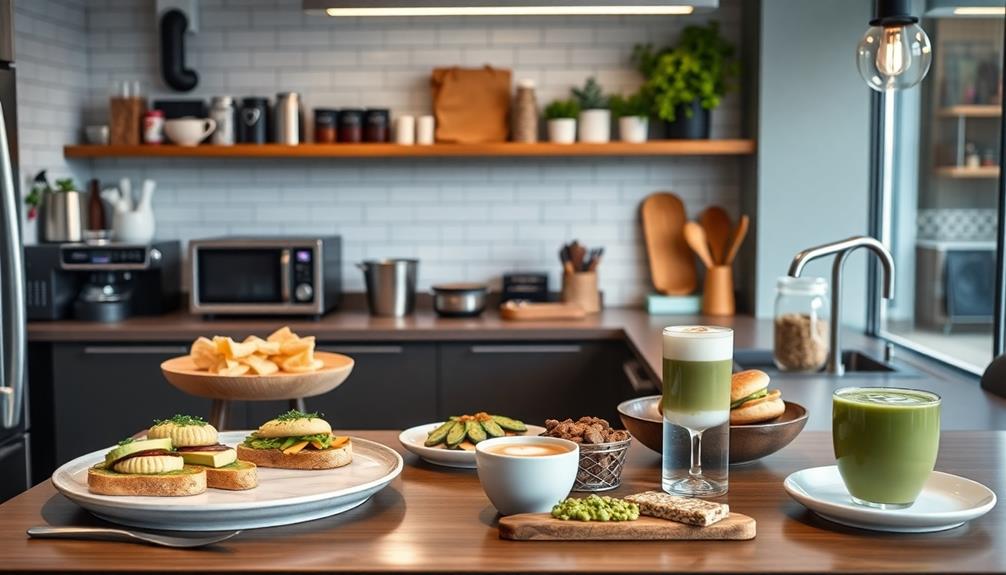
Embracing evolving food trends in tech culture, many individuals are gravitating toward foods that not only taste good but also reflect their values. Foods like organic cold-pressed juices and artisanal coffee have emerged as status symbols, showcasing a commitment to wellness and high-quality ingredients.
You might notice how these choices signal affluence and a discerning palate among your peers. Seasonal dishes, such as Nettle and Potato Soup, exemplify a connection to local farming practices and an appreciation for fresh, nutritious ingredients.
The rise of plant-based diets, featuring gourmet vegan meals and specialty meat alternatives, highlights a growing preference for sustainability. This trend resonates with tech-savvy individuals who prioritize ethical consumption.
Premium snacks, such as high-protein, low-carb options, often crafted by small-batch producers, add an aspirational flair to your snacking routine.
Moreover, memberships to exclusive food clubs or subscription services offering curated selections of gourmet foods illustrate a desire for unique culinary experiences that elevate your social standing.
As you participate in the clean eating movement, choosing non-GMO and locally sourced ingredients, you further align your eating habits with your ethical beliefs.
In this way, the foods you consume not only nourish you but also serve as powerful status symbols within the tech community, reflecting your values and lifestyle choices.
The Role of Health Consciousness
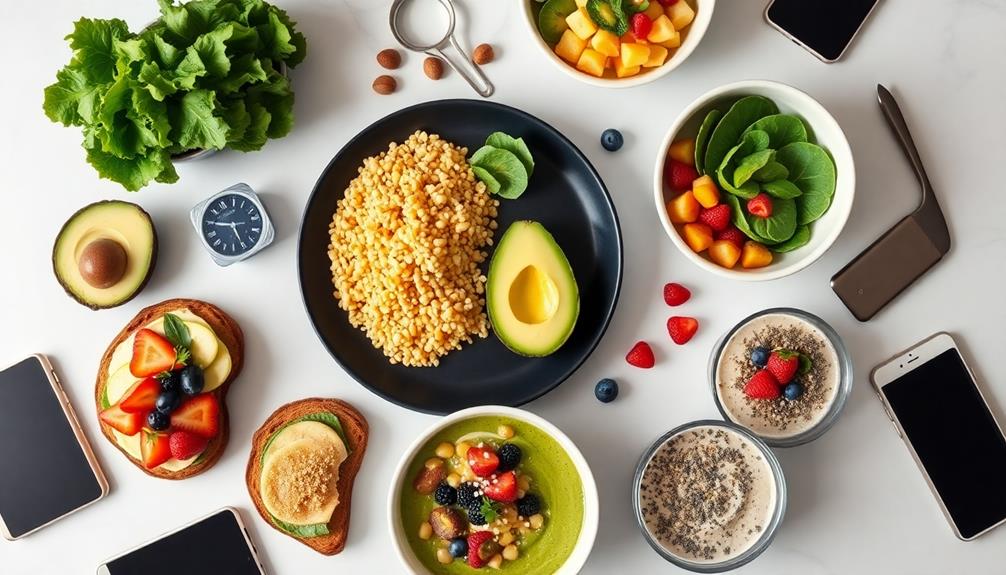
Health consciousness has skyrocketed in recent years, transforming how you and your peers approach food choices. You're not just grabbing whatever's available; you're seeking out pure foods that reflect your commitment to a healthier lifestyle.
Ethnic cuisines, such as Indian meals like Mushroom Masala, with their rich flavors and vegetarian-friendly options, are becoming increasingly popular among health-conscious individuals. With around 5% of the population willing to spend more for unadulterated options, it's clear that food quality is intertwined with social status.
For instance, unhomogenized milk priced at $1.75 per half-gallon symbolizes luxury among affluent individuals, reinforcing the idea that health-conscious choices are both sophisticated and aspirational.
The demand for pure foods, driven largely by 75 million Americans—especially affluent young professionals and educated students—highlights how health consciousness fuels social mobility.
You might notice that when you choose high-quality, health-oriented foods, you're not just eating; you're making a statement about your values and awareness.
This shift towards prioritizing nutrition and food safety reflects a growing trend where your food purchases act as a reflection of your personal image, with health consciousness emerging as a key status symbol in tech culture.
Sustainability as a Status Indicator
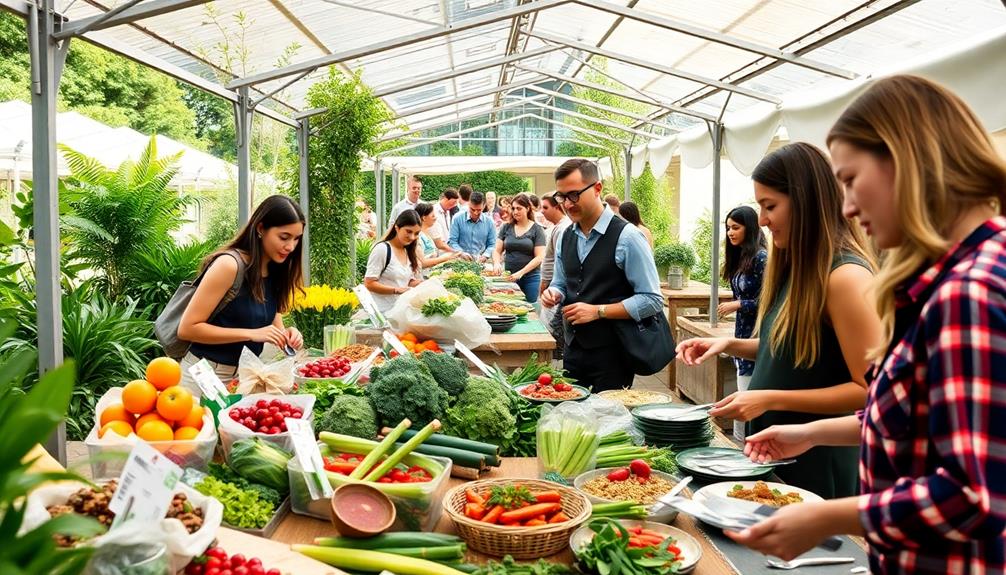
In today's tech culture, your choices reflect your values, and sustainability has become a key status indicator. As individuals increasingly seek out local ingredients and sustainable practices, the influence of diverse culinary traditions, such as Brazilian Cuisine, showcases how food can embody eco-consciousness.
Whether you're opting for thrifted vintage pieces, organic local foods, or embracing minimalism, each decision signals a commitment to mindful consumption. As more people prioritize eco-friendly practices, these choices not only enhance your lifestyle but also elevate your social standing.
Thrifting and Vintage Appeal
Thrifting has become more than just a budget-friendly shopping option; it's now a cultural statement that reflects a commitment to sustainability and individuality. For you, thrifting isn't just about saving money—85% of your peers feel the same way, and 42% are motivated by sustainable practices. With 83% of Gen Z participating in secondhand shopping, it's clear that vintage appeal is on the rise.
Rather than opting for traditional luxury goods, you and many others prefer unique, one-of-a-kind items that tell a story. In fact, 47% of individuals see thrifting as a trendy choice, showcasing a shift in status symbols. This growing trend emphasizes the importance of authenticity over mere branding.
Brands that genuinely prioritize sustainability resonate with you, especially as skepticism about luxury labels' sustainability claims grows. You value circular innovation and are drawn to products that align with your beliefs about climate change and mental health.
Ultimately, thrifting reflects your individuality while signaling a broader cultural movement that prioritizes genuine commitment over superficial appearances. In this way, thrifting has become an essential part of modern tech culture's status symbols.
Organic and Local Choices
Embracing organic and local food choices has transformed into a powerful status symbol within tech culture, reflecting a deeper commitment to sustainability and ethical consumption.
As you navigate this landscape, you'll notice that consuming organic foods—like unhomogenized milk and cage-free eggs—has become a hallmark of exclusivity. These premium options often come with price tags that are 25-40% higher than conventional alternatives, signaling not just a taste for quality, but a higher social standing.
This trend is particularly pronounced among affluent consumers and young professionals. About 5% of the population actively seeks organic and local options, indicating a significant economic shift.
The specialty food market, valued between $3 to $10 billion, underscores this movement towards higher-quality, sustainable food choices.
Moreover, consumers like you increasingly associate food quality with personal image and social mobility. Brands targeting tech-savvy individuals must prioritize transparency in sourcing and emphasize health and wellness.
Minimalism and Mindful Consumption
Minimalism and mindful consumption have become essential trends in tech culture, where you're encouraged to prioritize experiences and sustainable products over the clutter of excessive material goods.
This shift reflects a growing desire for guilt-free consumption and eco-conscious living, making sustainability a status symbol among the tech-savvy crowd.
Here are three ways minimalism and mindful consumption manifest in your life:
- Secondhand Shopping: With 83% of Gen Z engaging in secondhand shopping, you're likely to find economic and sustainable benefits, reducing waste while embracing unique finds.
- Pure Foods: You're drawn to foods marketed as unadulterated and ethically sourced. These premium options not only taste better but also signal your commitment to quality and transparency.
- Sustainable Brands: Supporting brands that prioritize sustainability and circular innovation shows your alignment with eco-conscious values, elevating your status among peers who appreciate mindful choices.
As societal attitudes evolve, your choices reflect a deeper commitment to minimalism and sustainability, transforming how you view consumption and status in tech culture.
Exclusive and Artisanal Offerings

In the domain of tech culture, exclusive and artisanal offerings have become the ultimate culinary status symbols. When you opt for handcrafted cheeses or small-batch chocolates, you're not just choosing a snack; you're embracing a lifestyle that prioritizes quality and rarity. These foods often command higher prices, appealing to consumers who value uniqueness in their culinary experiences.
The rise of food subscription services showcasing curated artisanal products reflects your desire for exclusive offerings that align with your values of craftsmanship and ethical consumption. Limited-edition items, like rare truffles or specialty coffees sourced from specific regions, serve as status symbols, emphasizing your access to premium products.
Moreover, many tech-savvy consumers, including yourself, gravitate towards sustainably sourced and produced artisanal foods, mirroring a cultural shift towards environmental consciousness.
The integration of technology in food production—like apps that connect you with local artisans or farmers—enhances the appeal of these exclusive foods, reinforcing their status as luxury items in your world. By choosing these offerings, you're not just eating; you're making a statement about your identity and values within the tech culture.
Social Media Influence on Food Choices

Social media has transformed how you choose what to eat, turning visually stunning dishes into coveted status symbols. You're not just eating; you're curating an online persona.
Platforms like Instagram and TikTok play a huge role in shaping your food preferences, as influencers promote trendy and premium options that often come with a hefty price tag. The social media influence on food choices is undeniable, particularly among younger generations.
Consider these key points:
- Visual Appeal: Dishes like avocado toast and artisanal smoothies thrive on social media, driving trends with hashtags like #foodporn.
- Gen Z Engagement: Over half of Gen Z is influenced by social media in their food decisions, showcasing the power of online visuals.
- Exclusive Offerings: The rise of "Instagrammable" foods prompts restaurants to craft unique menu items aimed at attracting social media attention.
As dining becomes a showcase for online status, you find yourself drawn to experiences that reflect evolving values in tech culture.
It's no longer just about flavor; it's about the image and social capital that comes with each meal.
Experience Over Ownership in Dining
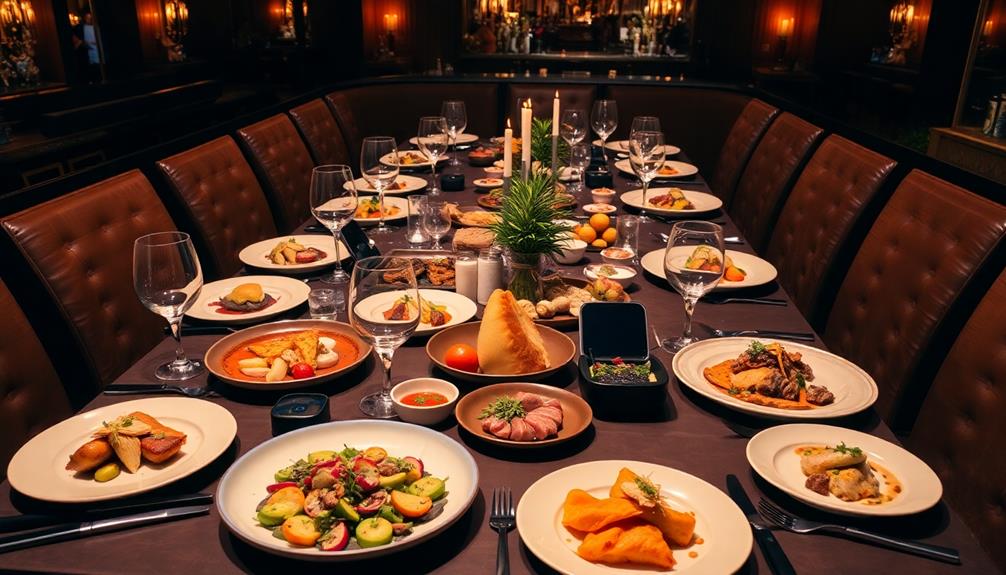
When you think about dining today, it's not just about the food; it's about the entire experience.
Exclusive dining spots and trendy food aesthetics have become the new status symbols, especially on social media.
As you share those visually stunning meals online, you're not just eating—you're showcasing your social standing.
Exclusive Dining Experiences
Exclusive dining experiences have emerged as a powerful status symbol in tech culture, reflecting a shift toward valuing unique culinary adventures over mere ownership of material goods. For many in this community, dining isn't just about food; it's a chance to showcase individuality and social capital.
Consider these points:
- Memorable Moments: A staggering 58% of Gen Z consumers prioritize unforgettable dining experiences, viewing them as a form of self-expression.
- Social Media Buzz: With 76% of diners sharing their culinary outings online, exclusive dining experiences gain prestige, amplifying their status symbol appeal.
- Connection: For 63% of millennials and Gen Z, enjoying high-end meals together fosters deeper connections, reinforcing the social currency tied to these experiences.
In this way, exclusive dining experiences aren't just meals, but events that enhance your social narrative.
The allure of Michelin-starred restaurants or themed pop-up events offers more than just food; it's about belonging to a community that values the extraordinary.
As these culinary adventures continue to rise in prominence, they solidify their place as essential status symbols in tech culture.
Trendy Food Aesthetics
Colorful dishes adorned with edible flowers and intricate designs have become the hallmark of trendy food aesthetics, enchanting diners and social media users alike. You're not just ordering food; you're curating an experience that doubles as a status symbol.
With 71% of Gen Z stating they're more likely to choose visually appealing meals, it's clear that dining is all about self-expression and social currency.
The rise of "Instagrammable" food, like elaborate smoothie bowls and artisanal coffees, reflects a significant shift in your dining preferences. Rather than simply consuming meals, you prioritize unique presentations that are worthy of sharing online.
This trend emphasizes sustainability and creativity, as many young consumers, 83% of whom engage in secondhand shopping, seek local eateries that offer innovative and eco-friendly options.
As dining evolves into memorable experiences, brands that focus on aesthetic presentation can foster customer loyalty. You see this in the 42% of young diners motivated by sustainability in their food choices.
Ultimately, sharing unique food experiences online transforms dining into a status symbol, making thrifted or unique items trendy and desirable.
Social Media Influence
The way you choose where to dine has shifted dramatically thanks to social media's influence. Dining isn't just about the food anymore; it's about the experience you can share with your followers. Unique and visually appealing dishes are now essential for attracting attention, pushing you to seek out restaurants that serve "Instagrammable" foods.
Here are three ways social media dictates your dining choices:
- Visual Appeal: You're drawn to colorful smoothie bowls and elaborate desserts that make for striking photos.
- Value Alignment: With 42% of Gen Z prioritizing sustainable and ethically sourced options, restaurants that reflect these values become more desirable status symbols.
- Trending Spots: Dining at high-profile restaurants featured in social media feeds has become a symbol of prestige, shifting the focus from ownership of luxury goods to the shared experience of dining.
Research shows that 71% of young consumers let social media influence their dining decisions, indicating that an engaging online presence can make or break a restaurant's status.
In this tech-driven age, the experience you share online holds more weight than ever.
Generational Shifts in Food Perception
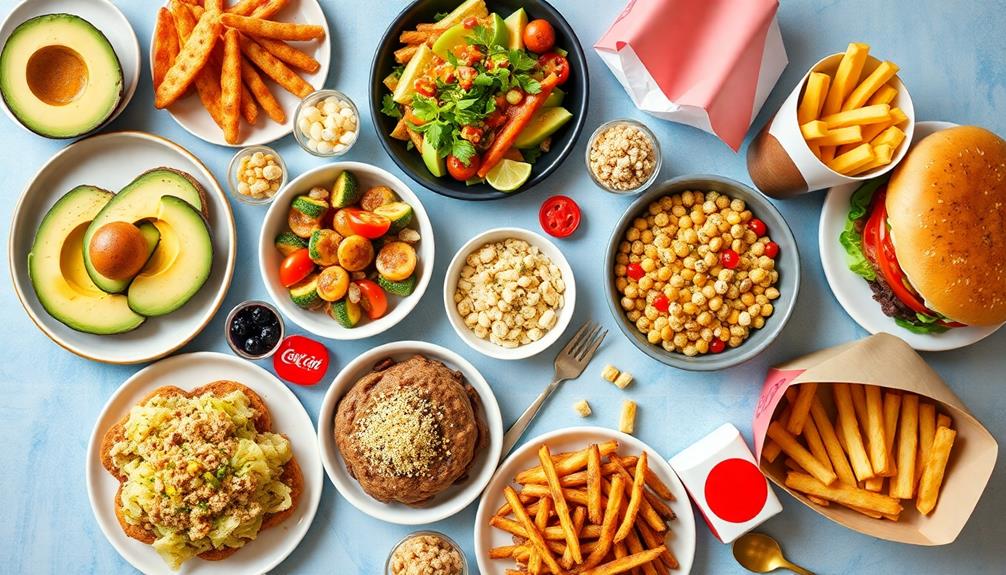
Shifting toward more health-conscious choices, younger generations, particularly Gen Z, are redefining what it means to eat well. Unlike previous generations, you prioritize organic and pure foods as status symbols, reflecting a deeper commitment to health and sustainability. You recognize that what you consume says a lot about your values, and this trend is reshaping food culture.
With 83% of Gen Z engaging in secondhand shopping, you demonstrate a preference for ethical practices that extend to your food choices. When you opt for premium organic products, you're not just choosing quality; you're making a statement about your lifestyle.
The specialty food market, worth between $3 to $10 billion, underscores this shift as you and your peers seek high-quality, health-oriented options that signify social class and sophistication.
Younger generations, especially young professionals, associate pure foods with personal image enhancement and upward mobility. By investing in these premium choices, you align your diet with your aspirations, reinforcing a narrative that health and sustainability are the new luxury.
In this evolving landscape, your food choices reflect not just nutritional values but also your social identity.
Intersection of Identity and Food
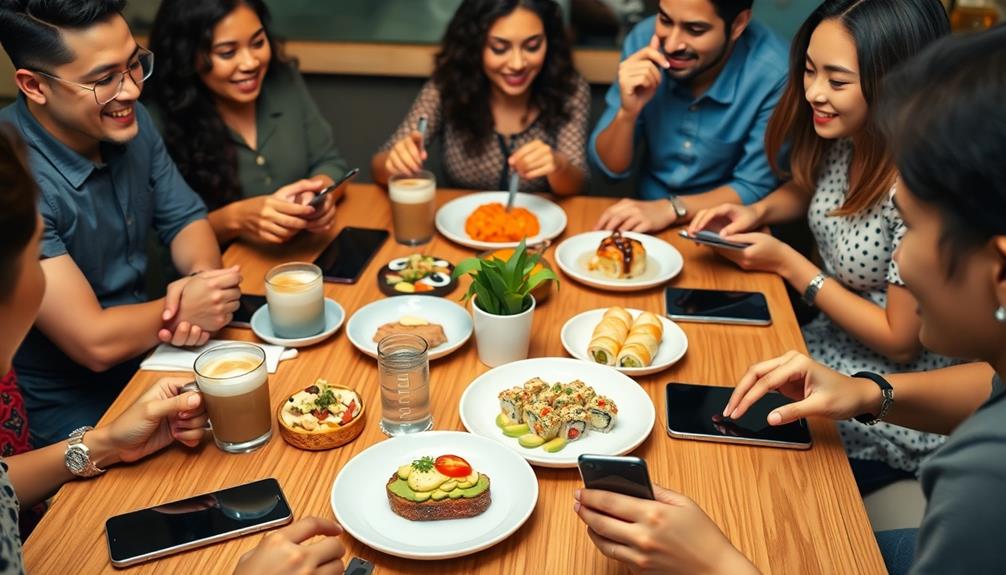
In tech culture, food choices are more than just sustenance; they're a reflection of identity and values. The foods you choose often serve as status symbols, demonstrating your commitment to health, sustainability, and quality.
As you navigate this landscape, consider how your selections connect to broader trends and personal beliefs.
- Organic and Artisanal Products: These foods signal an allegiance to eco-consciousness and wellness, showcasing your dedication to high-quality ingredients.
- Clean Eating Trends: By prioritizing transparency and sourcing, you align with the 95% of consumers wanting to know where their food comes from, reinforcing your values.
- Gourmet Experiences: High-end items like cold-pressed juices and specialty coffee reflect sophistication and status, particularly among millennials and Gen Z, who are willing to pay a premium for quality.
In this way, your food choices become a powerful means of self-expression.
As you share these experiences on social media, you cultivate a personal brand that resonates with your identity, aligning your dietary habits with the values of a tech-driven society.
Frequently Asked Questions
What Are Considered Status Symbols?
Status symbols include luxury items like designer clothing, high-end gadgets, exclusive memberships, and unique experiences. When you own or showcase these, you signal your success and social standing, influencing how others perceive you.
Is Food the New Status Symbol?
Absolutely, food's become a new status symbol. You express your identity and values through your choices, showcasing commitment to health and sustainability. When you choose trendy, artisanal options, you signal your lifestyle aspirations to others.
How Does a Product Become a Status Symbol?
A product becomes a status symbol when you perceive it as rare and exclusive. Marketing, cultural trends, and social media shape this perception, while high prices and quality reinforce its desirability among consumers like you.
What Are the Status Symbol Goods?
Status symbol goods include luxury items like designer handbags, high-end watches, organic foods, and premium kitchen appliances. You'll notice these products often reflect your wealth, taste, and commitment to quality and exclusivity in your lifestyle.
Conclusion
In the fast-paced domain of tech culture, the foods you choose can say more than you think. As trends shift and sustainability takes center stage, your next meal might just reveal your values. Imagine, for a moment, the impact of that exclusive artisanal dish or trendy superfood on your social standing. The question lingers: what does your plate truly reflect about you? In this evolving landscape, the answer could redefine not just your meals, but your very identity.









